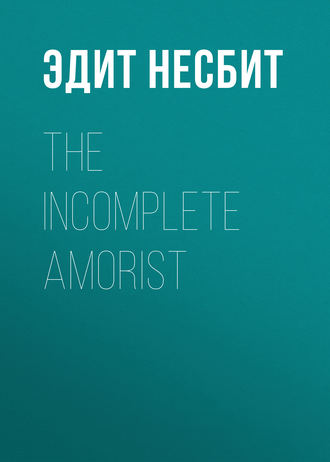
Эдит Несбит
The Incomplete Amorist
To
Richard Reynolds and Justus Miles Forman
"Faire naitre un désir, le nourrir, le développer, le grandir, le satisfaire, c'est un poeme tout entier."
—Balzac.
PEOPLE OF THE STORY
Eustace Vernon.
Betty Desmond
The Rev. Cecil Underwood
Miss Julia Desmond
Robert Temple
Lady St. Craye
Miss Voscoe
Madame Chevillon
Paula Conway
Mimi Chantal
Village Matrons, Concierges, Art Students, Etc.
The Incomplete Amorist
The Girl
Her Step-Father
Her Aunt
The Other Man
The Other Woman
The Art Student
The Inn-Keeper at Crez
A Soul in Hell
A Model
Book 1.—The Girl
CHAPTER I.
THE INEVITABLE
"No. The chemises aren't cut out. I haven't had time. There are enough shirts to go on with, aren't there, Mrs. James?" said Betty.
"We can make do for this afternoon, Miss, but the men they're getting blowed out with shirts. It's the children's shifts as we can't make shift without much longer." Mrs. James, habitually doleful, punctuated her speech with sniffs.
"That's a joke, Mrs. James," said Betty. "How clever you are!"
"I try to be what's fitting," said Mrs. James, complacently.
"Talk of fitting," said Betty, "If you like I'll fit on that black bodice for you, Mrs. Symes. If the other ladies don't mind waiting for the reading a little bit."
"I'd as lief talk as read, myself," said a red-faced sandy-haired woman; "books ain't what they was in my young days."
"If it's the same to you, Miss," said Mrs. Symes in a thick rich voice, "I'll not be tried on afore a room full. If we are poor we can all be clean's what I say, and I keeps my unders as I keeps my outside. But not before persons as has real imitation lace on their petticoat bodies. I see them when I was a-nursing her with her fourth. No, Miss, and thanking you kindly, but begging your pardon all the same."
"Don't mention it," said Betty absently. "Oh, Mrs. Smith, you can't have lost your thimble already. Why what's that you've got in your mouth?"
"So it is!" Mrs. Smith's face beamed at the gratifying coincidence. "It always was my habit, from a child, to put things there for safety."
"These cheap thimbles ain't fit to put in your mouth, no more than coppers," said Mrs. James, her mouth full of pins.
"Oh, nothing hurts you if you like it," said Betty recklessly. She had been reading the works of Mr. G.K. Chesterton.
A shocked murmur arose.
"Oh, Miss, what about the publy kows?" said Mrs. Symes heavily. The others nodded acquiescence.
"Don't you think we might have a window open?" said Betty. The May sunshine beat on the schoolroom windows. The room, crowded with the stout members of the "Mother's Meeting and Mutual Clothing Club," was stuffy, unbearable.
A murmur arose far more shocked than the first.
"I was just a-goin' to say why not close the door, that being what doors is made for, after all," said Mrs. Symes. "I feel a sort of draught a-creeping up my legs as it is."
The door was shut.
"You can't be too careful," said the red-faced woman; "we never know what a chill mayn't bring forth. My cousin's sister-in-law, she had twins, and her aunt come in and says she, 'You're a bit stuffy here, ain't you?' and with that she opens the window a crack,—not meaning no harm, Miss,—as it might be you. And within a year that poor unfortunate woman she popped off, when least expected. Gas ulsters, the doctor said. Which it's what you call chills, if you're a doctor and can't speak plain."
"My poor grandmother come to her end the same way," said Mrs. Smith, "only with her it was the Bible reader as didn't shut the door through being so set on shewing off her reading. And my granny, a clot of blood went to her brain, and her brain went to her head and she was a corpse inside of fifty minutes."
Every woman in the room was waiting, feverishly alert, for the pause that should allow her to begin her own detailed narrative of disease.
Mrs. James was easily first in the competition.
"Them quick deaths," she said, "is sometimes a blessing in disguise to both parties concerned. My poor husband—years upon years he lingered, and he had a bad leg—talk of bad legs, I wish you could all have seen it," she added generously.
"Was it the kind that keeps all on a-breaking out?" asked Mrs. Symes hastily, "because my youngest brother had a leg that nothing couldn't stop. Break out it would do what they might. I'm sure the bandages I've took off him in a morning—"
Betty clapped her hands.
It was the signal that the reading was going to begin, and the matrons looked at her resentfully. What call had people to start reading when the talk was flowing so free and pleasant?
Betty, rather pale, began: "This is a story about a little boy called Wee Willie Winkie."
"I call that a silly sort of name," whispered Mrs. Smith.
"Did he make a good end, Miss?" asked Mrs. James plaintively.
"You'll see," said Betty.
"I like it best when they dies forgiving of everybody and singing hymns to the last."
"And when they says, 'Mother, I shall meet you 'ereafter in the better land'—that's what makes you cry so pleasant."
"Do you want me to read or not?" asked Betty in desperation.
"Yes, Miss, yes," hummed the voices heavy and shrill.
"It's her hobby, poor young thing," whispered Mrs. Smith, "we all 'as 'em. My own is a light cake to my tea, and always was. Ush."
Betty read.
When the mothers had wordily gone, she threw open the windows, propped the door wide with a chair, and went to tea. She had it alone.
"Your Pa's out a-parishing," said Letitia, bumping down the tray in front of her.
"That's a let-off anyhow," said Betty to herself, and she propped up a Stevenson against the tea-pot.
After tea parishioners strolled up by ones and twos and threes to change their books at the Vicarage lending library. The books were covered with black calico, and smelt of rooms whose windows were never opened.
When she had washed the smell of the books off, she did her hair very carefully in a new way that seemed becoming, and went down to supper.
Her step-father only spoke once during the meal; he was luxuriating in the thought of the Summa Theologiae of Aquinas in leather still brown and beautiful, which he had providentially discovered in the wash-house of an ailing Parishioner. When he did speak he said:
"How extremely untidy your hair is, Lizzie. I wish you would take more pains with your appearance."
When he had withdrawn to his books she covered three new volumes for the library: the black came off on her hands, but anyway it was clean dirt.
She went to bed early.
"And that's my life," she said as she blew out the candle.
Said Mrs. James to Mrs. Symes over the last and strongest cup of tea:
"Miss Betty's ailing a bit, I fancy. Looked a bit peaky, it seemed to me. I shouldn't wonder if she was to go off in a decline like her father did."
"It wasn't no decline," said Mrs. Symes, dropping her thick voice, "'e was cut off in the midst of his wicked courses. A judgment if ever there was one."
Betty's blameless father had been killed in the hunting field.
"I daresay she takes after him, only being a female it all turns to her being pernickety in her food and allus wanting the windows open. And mark my words, it may turn into a decline yet, Mrs. Symes, my dear."
Mrs. Symes laughed fatly. "That ain't no decline," she said, "you take it from me. What Miss Betty wants is a young man. It is but nature after all, and what we must all come to, gentle or simple. Give her a young man to walk out with and you'll see the difference. Decline indeed! A young man's what she wants. And if I know anything of gells and their ways she'll get one, no matter how close the old chap keeps her."
Mrs. Symes was not so wrong as the delicate minded may suppose.
Betty did indeed desire to fall in love. In all the story books the main interest of the heroine's career began with that event. Not that she voiced the desire to herself. Only once she voiced it in her prayers.
"Oh, God," she said, "do please let something happen!"
That was all. A girl had her little reticences, even with herself, even with her Creator.
Next morning she planned to go sketching; but no, there were three more detestable books to be put into nasty little black cotton coats, the drawing-room to be dusted—all the hateful china—the peas to be shelled for dinner.
She shelled the peas in the garden. It was a beautiful green garden, and lovers could have walked very happily down the lilac-bordered paths.
"Oh, how sick I am of it all!" said Betty. She would not say, even to herself, that what she hated was the frame without the picture.
As she carried in the peas she passed the open window of the study where, among shelves of dull books and dusty pamphlets, her step-father had as usual forgotten his sermon in a chain of references to the Fathers. Betty saw his thin white hairs, his hard narrow face and tight mouth, the hands yellow and claw-like that gripped the thin vellum folio.
"I suppose even he was young once," she said, "but I'm sure he doesn't remember it."
He saw her go by, young and alert in the sunshine, and the May air stirred the curtains. He looked vaguely about him, unlocked a drawer in his writing-table, and took out a leather case. He gazed long at the face within, a young bright face with long ringlets above the formal bodice and sloping shoulders of the sixties.
"Well, well," he said, "well, well," locked it away, and went back to De Poenis Parvulorum.
"I will go out," said Betty, as she parted with the peas. "I don't care!"
It was not worth while to change one's frock. Even when one was properly dressed, at rare local garden-party or flower-show, one never met anyone that mattered.
She fetched her sketching things. At eighteen one does so pathetically try to feed the burgeoning life with the husks of polite accomplishment. She insisted on withholding from the clutches of the Parish the time to practise Beethoven and Sullivan for an hour daily. Daily, for half an hour, she read an improving book. Just now it was The French Revolution, and Betty thought it would last till she was sixty. She tried to read French and German—Télémaque and Maria Stuart. She fully intended to become all that a cultured young woman should be. But self-improvement is a dull game when there is no one to applaud your score.
What the gardener called the gravel path was black earth, moss-grown. Very pretty, but Betty thought it shabby.
It was soft and cool, though, to the feet, and the dust of the white road sparkled like diamond dust in the sunlight.
She crossed the road and passed through the swing gate into the park, where the grass was up for hay, with red sorrel and buttercups and tall daisies and feathery flowered grasses, their colours all tangled and blended together like ravelled ends of silk on the wrong side of some great square of tapestry. Here and there in the wide sweep of tall growing things stood a tree—a may-tree shining like silver, a laburnum like fine gold. There were horse-chestnuts whose spires of blossom shewed like fat candles on a Christmas tree for giant children. And the sun was warm and the tree shadows black on the grass.
Betty told herself that she hated it all. She took the narrow path—the grasses met above her feet—crossed the park, and reached the rabbit warren, where the chalk breaks through the thin dry turf, and the wild thyme grows thick.
A may bush, overhanging a little precipice of chalk, caught her eye. A wild rose was tangled round it. It was, without doubt, the most difficult composition within sight.
"I will sketch that," said Eighteen, confidently.
For half an hour she busily blotted and washed and niggled. Then she became aware that she no longer had the rabbit warren to herself.
"And he's an artist, too!" said Betty. "How awfully interesting! I wish I could see his face."
But this his slouched Panama forbade. He was in white, the sleeve and breast of his painting jacket smeared with many colours; he had a camp-stool and an easel and looked, she could not help feeling, much more like a real artist than she did, hunched up as she was on a little mound of turf, in her shabby pink gown and that hateful garden hat with last year's dusty flattened roses in it.
She went on sketching with feverish unskilled fingers, and a pulse that had actually quickened its beat.
She cast little glances at him as often as she dared. He was certainly a real artist. She could tell that by the very way he held his palette. Was he staying with people about there? Should she meet him? Would they ever be introduced to each other?
"Oh, what a pity," said Betty from the heart, "that we aren't introduced now!"
Her sketch grew worse and worse.
"It's no good," she said. "I can't do anything with it."
She glanced at him. He had pushed back the hat. She saw quite plainly that he was smiling—a very little, but he was smiling. Also he was looking at her, and across the fifteen yards of gray turf their eyes met. And she knew that he knew that this was not her first glance at him.
She paled with fury.
"He has been watching me all the time! He is making fun of me. He knows I can't sketch. Of course he can see it by the silly way I hold everything." She ran her knife around her sketch, detached it, and tore it across and across.
The stranger raised his hat and called eagerly.
"I say—please don't move for a minute. Do you mind? I've just got your pink gown. It's coming beautifully. Between brother artists—Do, please! Do sit still and go on sketching—Ah, do!"
Betty's attitude petrified instantly. She held a brush in her hand, and she looked down at her block. But she did not go on sketching. She sat rigid and three delicious words rang in her ears: "Between brother artists!" How very nice of him! He hadn't been making fun, after all. But wasn't it rather impertinent of him to put her in his picture without asking her? Well, it wasn't she but her pink gown he wanted. And "between brother artists!" Betty drew a long breath.
"It's no use," he called; "don't bother any more. The pose is gone."
She rose to her feet and he came towards her.
"Let me see the sketch," he said. "Why did you tear it up?" He fitted the pieces together. "Why, it's quite good. You ought to study in Paris," he added idly.
She took the torn papers from his hand with a bow, and turned to go.
"Don't go," he said. "You're not going? Don't you want to look at my picture?"
Now Betty knew as well as you do that you musn't speak to people unless you've been introduced to them. But the phrase "brother artists" had played ninepins with her little conventions.
"Thank you. I should like to very much," said Betty. "I don't care," she said to herself, "and besides, it's not as if he were a young man, or a tourist, or anything. He must be ever so old—thirty; I shouldn't wonder if he was thirty-five."
When she saw the picture she merely said, "Oh," and stood at gaze. For it was a picture—a picture that, seen in foreign lands, might well make one sick with longing for the dry turf and the pale dog violets that love the chalk, for the hum of the bees and the scent of the thyme. He had chosen the bold sweep of the brown upland against the sky, and low to the left, where the line broke, the dim violet of the Kentish hills. In the green foreground the pink figure, just roughly blocked in, was blocked in by a hand that knew its trade, and was artist to the tips of its fingers.
"Oh!" said Betty again.
"Yes," said he, "I think I've got it this time. I think it'll make a hole in the wall, eh? Yes; it is good!"
"Yes," said Betty; "oh, yes."
"Do you often go a-sketching?" he asked.
"How modest he is," thought Betty; "he changes the subject so as not to seem to want to be praised."
Aloud she answered with shy fluttered earnestness: "Yes—no. I don't know. Sometimes."
His lips were grave, but there was the light behind his eyes that goes with a smile.
"What unnecessary agitation!" he was thinking. "Poor little thing, I suppose she's never seen a man before. Oh, these country girls!" Aloud he was saying: "This is such a perfect country. You ought to sketch every day."
"I've no one to teach me," said Betty, innocently phrasing a long-felt want.
The man raised his eyebrows. "Well, after that, here goes!" he said to himself. "I wish you'd let me teach you," he said to her, beginning to put his traps together.
"Oh, I didn't mean that," said Betty in real distress. What would he think of her? How greedy and grasping she must seem! "I didn't mean that at all!"
"No; but I do," he said.
"But you're a great artist," said Betty, watching him with clasped hands. "I suppose it would be—I mean—don't you know, we're not rich, and I suppose your lessons are worth pounds and pounds."
"I don't give lessons for money," his lips tightened—"only for love."
"That means nothing, doesn't it?" she said, and flushed to find herself on the defensive feebly against—nothing.
"At tennis, yes," he said, and to himself he added: "Vieux jeu, my dear, but you did it very prettily."
"But I couldn't let you give me lessons for nothing."
"Why not?" he asked. And his calmness made Betty feel ashamed and sordid.
"I don't know," she answered tremulously, "but I don't think my step-father would want me to."
"You think it would annoy him?"
"I'm sure it would, if he knew about it."
Betty was thinking how little her step-father had ever cared to know of her and her interests. But the man caught the ball as he saw it.
"Then why let him know?" was the next move; and it seemed to him that Betty's move of rejoinder came with a readiness born of some practice at the game.
"Oh," she said innocently, "I never thought of that! But wouldn't it be wrong?"
"She's got the whole thing stereotyped. But it's dainty type anyhow," he thought. "Of course it wouldn't be wrong," he said. "It wouldn't hurt him. Don't you know that nothing's wrong unless it hurts somebody?"
"Yes," she said eagerly, "that's what I think. But all the same it doesn't seem fair that you should take all that trouble for me and get nothing in return."
"Well played! We're getting on!" he thought, and added aloud: "But perhaps I shan't get nothing in return?"
Her eyes dropped over the wonderful thought that perhaps she might do something for him. But what? She looked straight at him, and the innocent appeal sent a tiny thorn of doubt through his armour of complacency. Was she—after all? No, no novice could play the game so well. And yet—
"I would do anything I could, you know," she said eagerly, "because it is so awfully kind of you, and I do so want to be able to paint. What can I do?"
"What can you do?" he asked, and brought his face a little nearer to the pretty flushed freckled face under the shabby hat. Her eyes met his. He felt a quick relenting, and drew back.
"Well, for one thing you could let me paint your portrait."
Betty was silent.
"Come, play up, you little duffer," he urged inwardly.
When she spoke her voice trembled.
"I don't know how to thank you," she said.
"And you will?"
"Oh, I will; indeed I will!"
"How good and sweet you are," he said. Then there was a silence.
Betty tightened the strap of her sketching things and said:
"I think I ought to go home now."
He had the appropriate counter ready.
"Ah, don't go yet!" he said; "let us sit down; see, that bank is quite in the shade now, and tell me—"
"Tell you what?" she asked, for he had made the artistic pause.
"Oh, anything—anything about yourself."
Betty was as incapable of flight as any bird on a limed twig.
She walked beside him to the bank, and sat down at his bidding, and he lay at her feet, looking up into her eyes. He asked idle questions: she answered them with a conscientious tremulous truthfulness that showed to him as the most finished art. And it seemed to him a very fortunate accident that he should have found here, in this unlikely spot, so accomplished a player at his favorite game. Yet it was the variety of his game for which he cared least. He did not greatly relish a skilled adversary. Betty told him nervously and in words ill-chosen everything that he asked to know, but all the while the undercurrent of questions rang strong within her—"When is he to teach me? Where? How?"—so that when at last there was left but the bare fifteen minutes needed to get one home in time for the midday dinner she said abruptly:
"And when shall I see you again?"
"You take the words out of my mouth," said he. And indeed she had. "She has no finesse yet," he told himself. "She might have left that move to me."
"The lessons, you know," said Betty, "and, and the picture, if you really do want to do it."
"If I want to do it!—You know I want to do it. Yes. It's like the nursery game. How, when and where? Well, as to the how—I can paint and you can learn. The where—there's a circle of pines in the wood here. You know it? A sort of giant fairy ring?"
She did know it.
"Now for the when—and that's the most important. I should like to paint you in the early morning when the day is young and innocent and beautiful—like—like—" He was careful to break off in a most natural seeming embarrassment. "That's a bit thick, but she'll swallow it all right. Gone down? Right!" he told himself.
"I could come out at six if you liked, or—or five," said Betty, humbly anxious to do her part.
He was almost shocked. "My good child," he told her silently, "someone really ought to teach you not to do all the running. You don't give a man a chance."
"Then will you meet me here to-morrow at six?" he said. "You won't disappoint me, will you?" he added tenderly.
"No," said downright Betty, "I'll be sure to come. But not to-morrow," she added with undisguised regret; "to-morrow's Sunday."
"Monday then," said he, "and good-bye."
"Good-bye, and—oh, I don't know how to thank you!"
"I'm very much mistaken if you don't," he said as he stood bareheaded, watching the pink gown out of sight.
"Well, adventures to the adventurous! A clergyman's daughter, too! I might have known it."






